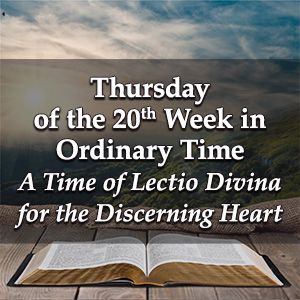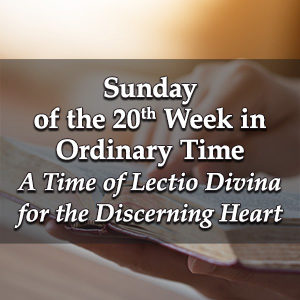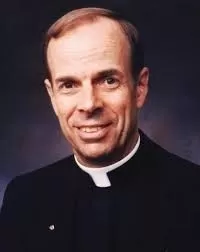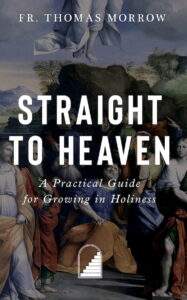Podcast: Play in new window | Download (Duration: 8:53 — 6.2MB) | Embed
Subscribe: Apple Podcasts | Spotify | Amazon Music | Android | Pandora | iHeartRadio | JioSaavn | Podchaser | Gaana | Podcast Index | Email | TuneIn | Deezer | Anghami | RSS | More
 Thursday of the Twentieth Week in Ordinary Time – A Time of Lectio Divina for the Discerning Heart Podcast
Thursday of the Twentieth Week in Ordinary Time – A Time of Lectio Divina for the Discerning Heart Podcast
As you begin, take a deep breath and exhale slowly. For at least the next few moments, surrender all the cares and concerns of this day to the Lord.
Say slowly from your heart “Jesus, I Trust In You…You Take Over”
Become aware that He is with you, looking upon you with love, wanting to be heard deep within in your heart…
From the Holy Gospel According to St. John 1:45-51
Philip found Nathanael and said to him, ‘We have found the one Moses wrote about in the Law, the one about whom the prophets wrote: he is Jesus son of Joseph, from Nazareth.’ ‘From Nazareth?’ said Nathanael ‘Can anything good come from that place?’ ‘Come and see’ replied Philip. When Jesus saw Nathanael coming he said of him, ‘There is an Israelite who deserves the name, incapable of deceit.’ ‘How do you know me?’ said Nathanael. ‘Before Philip came to call you,’ said Jesus ‘I saw you under the fig tree.’ Nathanael answered, ‘Rabbi, you are the Son of God, you are the King of Israel.’ Jesus replied, ‘You believe that just because I said: I saw you under the fig tree. You will see greater things than that.’ And then he added ‘I tell you most solemnly, you will see heaven laid open and, above the Son of Man, the angels of God ascending and descending.’
What word made this passage come alive for you?
What did you sense the Lord saying to you?
Once more give the Lord an opportunity to speak to you:
Philip found Nathanael and said to him, ‘We have found the one Moses wrote about in the Law, the one about whom the prophets wrote: he is Jesus son of Joseph, from Nazareth.’ ‘From Nazareth?’ said Nathanael ‘Can anything good come from that place?’ ‘Come and see’ replied Philip. When Jesus saw Nathanael coming he said of him, ‘There is an Israelite who deserves the name, incapable of deceit.’ ‘How do you know me?’ said Nathanael. ‘Before Philip came to call you,’ said Jesus ‘I saw you under the fig tree.’ Nathanael answered, ‘Rabbi, you are the Son of God, you are the King of Israel.’ Jesus replied, ‘You believe that just because I said: I saw you under the fig tree. You will see greater things than that.’ And then he added ‘I tell you most solemnly, you will see heaven laid open and, above the Son of Man, the angels of God ascending and descending.’
What did your heart feel as you listened?
What did you sense the Lord saying to you?
Once more, through Him, with Him and in Him listen to the Word:
Philip found Nathanael and said to him, ‘We have found the one Moses wrote about in the Law, the one about whom the prophets wrote: he is Jesus son of Joseph, from Nazareth.’ ‘From Nazareth?’ said Nathanael ‘Can anything good come from that place?’ ‘Come and see’ replied Philip. When Jesus saw Nathanael coming he said of him, ‘There is an Israelite who deserves the name, incapable of deceit.’ ‘How do you know me?’ said Nathanael. ‘Before Philip came to call you,’ said Jesus ‘I saw you under the fig tree.’ Nathanael answered, ‘Rabbi, you are the Son of God, you are the King of Israel.’ Jesus replied, ‘You believe that just because I said: I saw you under the fig tree. You will see greater things than that.’ And then he added ‘I tell you most solemnly, you will see heaven laid open and, above the Son of Man, the angels of God ascending and descending.’
What touched your heart in this time of prayer?
What did your heart feel as you prayed?
What do you hope to carry with you from this time with the Lord?
Our Father, who art in heaven,
hallowed be thy name.
Thy kingdom come.
Thy will be done on earth, as it is in heaven.
Give us this day our daily bread,
and forgive us our trespasses,
as we forgive those who trespass against us,
and lead us not into temptation,
but deliver us from evil.
Amen

 Dr. Lilles discusses the “Living Water” as described by St. Teresa of Avila “The Way of Perfection.” We also discuss the nature of mystical prayer.
Dr. Lilles discusses the “Living Water” as described by St. Teresa of Avila “The Way of Perfection.” We also discuss the nature of mystical prayer.




 Sunday of the Twentieth Week in Ordinary Time – A Time of Lectio Divina for the Discerning Heart Podcast
Sunday of the Twentieth Week in Ordinary Time – A Time of Lectio Divina for the Discerning Heart Podcast



 Dr. Lilles reviews teachings on poverty, humility, and, in particular, friendship, which are all found in a broad overview of the first 18 chapters of “The Way of Perfection.” We also discuss the value of the virtues and the importance of the “good example” in St. Teresa’s writings. All of this will be essential to her foundational teachings on contemplative prayer.
Dr. Lilles reviews teachings on poverty, humility, and, in particular, friendship, which are all found in a broad overview of the first 18 chapters of “The Way of Perfection.” We also discuss the value of the virtues and the importance of the “good example” in St. Teresa’s writings. All of this will be essential to her foundational teachings on contemplative prayer.